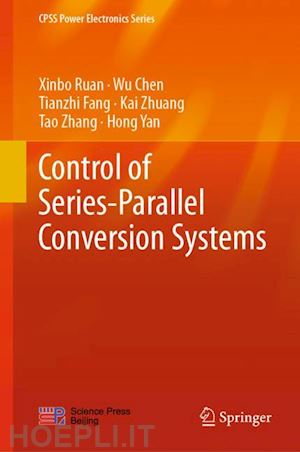
Questo prodotto usufruisce delle SPEDIZIONI GRATIS
selezionando l'opzione Corriere Veloce in fase di ordine.
Pagabile anche con Carta della cultura giovani e del merito, 18App Bonus Cultura e Carta del Docente
Series-parallel conversion systems, in which multiple standardized converter modules are connected in series or parallel at the input and output sides, to meet the demands of various applications. This book focuses on the control strategies for the series-parallel conversion systems with DC-DC converters and DC-AC inverters as the basic modules, respectively, to achieve input voltage/current sharing and output voltage/current sharing among the constituent modules. The detailed theoretical analysis with design examples and experimental validations are presented. This book is essential and valuable reference for graduate students and academics majoring in power electronics and engineers engaged in developing DC-DC converters, DC-AC inverters and power electronics transformers.
Introduction.- A General Control Strategy for DC-DC Series-Parallel Power Conversion Systems.- Mathematical Model of DC-DC ISOP System and Closed-Loop Parameters Design.- Wireless IVS Control Strategies for Input-Series-Connected Systems Based on Positive Output Voltage Gradient Method.- General Control Strategy for DC-AC Inverter Series-Parallel Combined System.- Compound Balanced Control Strategy for Input-Series-Output-Parallel DC-AC Inverter System.- Compound Balanced Control Strategy for Input-Series-Output-Series DC-AC Inverter System.- An Improved Average Current Control Strategy for Input-Parallel-Output-Parallel Inverter System.- Input Voltage Sharing Control Strategy for ISOP Systems under Extreme Load Conditions.
Xinbo Ruan was born in Hubei Province, China, in 1970. He received his BS and PhD in Electrical Engineering from Nanjing University of Aeronautics and Astronautics (NUAA), China, in 1991 and 1996, respectively. In 1996, he joined the Faculty of Electrical Engineering Teaching and Research Division, NUAA, where he became a Professor at the College of Automation Engineering in 2002 and engaged in teaching and research in the field of power electronics. From August to October 2007, he was a Research Fellow at the Department of Electronic and Information Engineering, Hong Kong Polytechnic University, Hong Kong, China. From March 2008 to September 2011, he was also with the School of Electrical and Electronic Engineering, Huazhong University of Science and Technology, China. He is also a Guest Professor at Beijing Jiaotong University, China; Hefei University of Technology, China; and Wuhan University, China. He has authored or co-authored nine books and more than 300 technical papers published in journals and conference proceedings. His main research interests include soft-switching DC-DC converters, soft-switching inverters, power-factor correction converters, modeling of converters, power electronics system integration, and renewable energy generation systems.
Dr. Ruan received the Delta Scholarship from the Delta Environment and Education Fund in 2003 and became the Special Appointed Professor of the Ministry of Education Chang Jiang Scholar Program in 2007. From 2005 to 2013, and again from 2017, he served as Vice President of the China Power Supply Society, and since 2008 he has been a member of the Technical Committee on Renewable Energy Systems within the IEEE Industrial Electronics Society. Currently, he serves as an Associate Editor for IEEE Transactions on Industrial Electronics, IEEE Transactions on Power Electronics, IEEE Journal of Emerging and Selected Topics on Power Electronics and IEEE Transactions on Circuits and Systems-II.











Il sito utilizza cookie ed altri strumenti di tracciamento che raccolgono informazioni dal dispositivo dell’utente. Oltre ai cookie tecnici ed analitici aggregati, strettamente necessari per il funzionamento di questo sito web, previo consenso dell’utente possono essere installati cookie di profilazione e marketing e cookie dei social media. Cliccando su “Accetto tutti i cookie” saranno attivate tutte le categorie di cookie. Per accettare solo deterninate categorie di cookie, cliccare invece su “Impostazioni cookie”. Chiudendo il banner o continuando a navigare saranno installati solo cookie tecnici. Per maggiori dettagli, consultare la Cookie Policy.